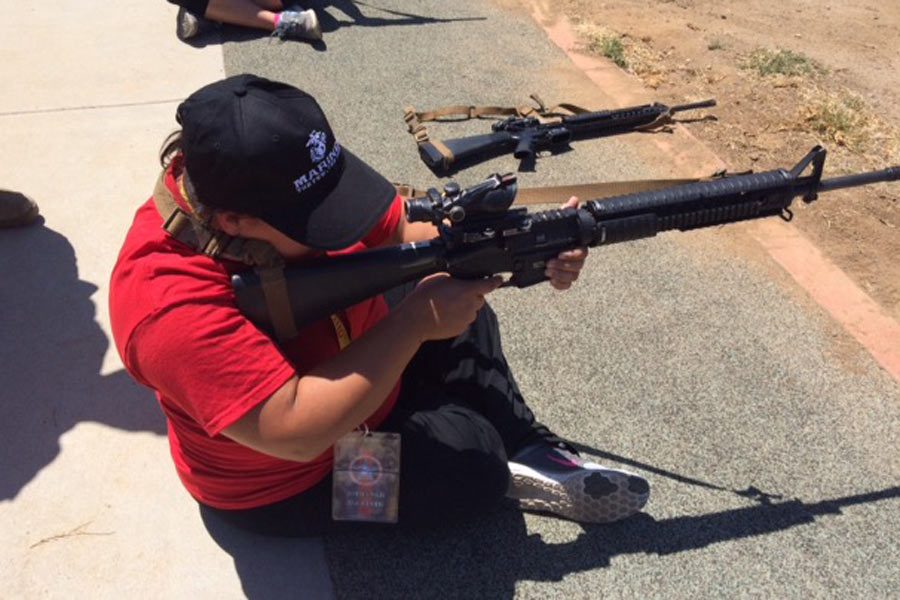Marine life
REACH teacher spends week at Marine training camp
September 13, 2016
The man in the combat uniform was screaming so loud, she felt like she’d burst an eardrum. He was angry, she thought with trepidation. Enraged, even. Red in the face, a vein throbbing furiously somewhere in the region of his temple. And she’d only just met the guy two minutes ago.
And so off the bus they scurried, all those teachers accustomed to Crayola supplies and sedate school lounges who had never quite had an experience like this before: now there were multiple people yelling, something about standing on yellow footprints stamped onto the ground; now there were directives being hurled at them lightning-fast, so that they didn’t quite know what to do; now they were being called good-for-nothing’s, imbeciles who couldn’t follow simple directions if those directions slapped them in face–and quite honestly, they wouldn’t have put that past these noisy, aggressive strangers; now they were shaking in their tennis shoes and wondering what on earth they were thinking when they’d signed up to participate in this week-long educator’s workshop, hosted by the U.S. Marine Corps.
For REACH teacher Jenny Walker, though, the goal was simple.
“I wanted to have an experience where we could bring back information and tell our students what exactly they would have to prepare for [in the Marines] and what it was like,” Walker said. “That way I could give them a more educated idea about what they might experience so that as I talked to my students I knew firsthand who [the Marines] would work for and who it wouldn’t work for.”
During her stay at the camp in San Diego, Calif., Walker and fellow teachers practiced total immersion into the military world; this required extensive physical training, with obstacle courses and typical drills, as well as learning to operate equipment.
“They let us go through the qualifying test and we all failed miserably,” Walker said. “Then our instructors yelled at us and were like ‘You’re the worst marines we’ve ever seen’ and you’re like ‘Sorry, we’re all old!’. We got to shoot automatic weapons, and I’ve never shot a gun before in my life, so that was really exciting, and we had to wear the gear and put on the packs and see how heavy they are and all that.”
But the camp didn’t focus just on actual physical activity.
“Mixed in with all that physical stuff they were just very open and honest about opportunities in the military, [and] the kids who are a good fit and the kids who aren’t a good fit, because it’s not for everyone,” Walker said. “And we got to meet a lot of people who have been in the marines their entire career, some who have been there for only four years, and then some who are in the reserves. We also got to meet some retired marines, and it was just a full view of what a marine life is.”
Walker’s takeaway was a firsthand, detailed picture of military life, which she plans to share with her students in order to help them make fully informed decisions about their future.
“It was just really good and it made me have a good idea about the Marine Corps,” Walker said. “ One afternoon I texted some of my students who had just graduated and said ‘You really need to think about this. I think it would be a good fit for you’. And now I’ll have more to say to my students this year about the military as an option, because I think it’s a really great fit for a lot of kids.”
Her appreciation for military personnel has deepened as well.
“I just feel so proud to have these men and women who stand up and say ‘I love the United States of America and I want to be there representing us wherever in the world we’re needed’,” Walker said. “The training that they go through and all of the things they do, it’s all for our freedom…our freedom and the things we take for granted, those are things that are so beautiful and precious to us and we wouldn’t have those things if it weren’t for our strong military. When i was on that base I was so in awe of those men and women.”
Walker recalled one instance where she spoke to a young marine who shared his story with her.
“I asked him why he became a marine,” Walker said. “And he reminded me so much of my REACH students; college was not something that was talked about in his home, his parents worked blue collar jobs, there wasn’t a lot of extra money around and he knew that if he wanted to go to college he was going to have to pay for it and this was it. And I was just so proud of him. He was from Arizona, I didn’t know him from anyone else in the world. But I did know him because he’s like so many of my students. You just get so proud of young people who make choices like this, and say ‘I’m going to save my country, and I’m going to go through this exhaustive training and make a way for myself’.”















